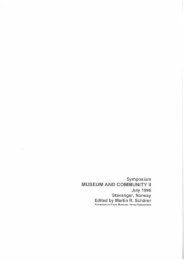Key Concepts of Museology - ICOM
Key Concepts of Museology - ICOM
Key Concepts of Museology - ICOM
Create successful ePaper yourself
Turn your PDF publications into a flip-book with our unique Google optimized e-Paper software.
EDUCATION<br />
n. (Latin: educatio, educere, to guide, to lead<br />
out <strong>of</strong>) – Equivalent in French: éducation; Spanish:<br />
educación; German: Erziehung, Museumspädagogik;<br />
Italian: istruzione; Portuguese:<br />
educaçāo.<br />
Generally speaking, education means<br />
the training and development <strong>of</strong><br />
human beings and their capacities by<br />
implementing the appropriate means<br />
to do so. Museum education can be<br />
defi ned as a set <strong>of</strong> values, concepts,<br />
knowledge and practices aimed at<br />
ensuring the visitor’s development;<br />
it is a process <strong>of</strong> acculturation which<br />
relies on pedagogical methods, development,<br />
fulfi lment, and the acquisition<br />
<strong>of</strong> new knowledge.<br />
1. The concept education should be<br />
defi ned in relation to other terms, the<br />
fi rst <strong>of</strong> these being instruction, which<br />
“concerns the mind and is understood<br />
as knowledge acquired by which<br />
one becomes skilful and learned”<br />
(Toraille, 1985). Education relates<br />
to both the heart and the mind, and<br />
is understood as knowledge which<br />
one aims to update in a relationship<br />
which sets knowledge in motion to<br />
develop understanding and individual<br />
reinvestment. Education is the<br />
action <strong>of</strong> developing moral, physical,<br />
intellectual and scientifi c values, and<br />
E<br />
knowledge. Knowledge, know-how,<br />
being and knowing how to be are four<br />
major components in the educational<br />
fi eld. The term education comes<br />
from the Latin “educere”, to lead out<br />
<strong>of</strong> (i.e. out <strong>of</strong> childhood) which assumes<br />
a dimension <strong>of</strong> active accompaniment<br />
in the transmission process.<br />
It is connected with the notion <strong>of</strong><br />
awakening, which aims to arouse<br />
curiosity, to lead to questioning and<br />
develop the capacity to think. The<br />
purpose <strong>of</strong> informal education is thus<br />
to develop the senses and awareness;<br />
it is a development process which presupposes<br />
change and transformation<br />
rather than conditioning and inculcation,<br />
notions it tends to oppose.<br />
The shaping <strong>of</strong> it therefore happens<br />
via instruction which conveys useful<br />
knowledge, and education which<br />
makes this knowledge transformable<br />
and able to be reinvested by the individual<br />
to further the process <strong>of</strong> his<br />
becoming a human being.<br />
2. In a more specifi cally museum<br />
context, education is the mobilisation<br />
<strong>of</strong> knowledge stemming from<br />
the museum and aimed at the development<br />
and the fulfi lment <strong>of</strong> individuals,<br />
through the assimilation <strong>of</strong><br />
this knowledge, the development <strong>of</strong><br />
new sensitivities and the realisation <strong>of</strong><br />
new experiences. “Museum pedagogy<br />
31
















